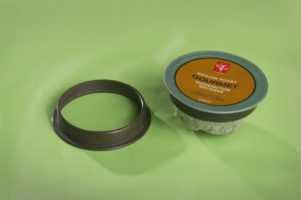LEAMINGTON, Ont., Canada – A unique partnership involving a local biopolymer compounding company, technology from the University of Guelph and a food packaging company could make single serve coffee pod garbage a thing of the past.
Competitive Green Technologies of Leamington, Ont. is working with the world’s leading single serve coffee brand owners on a recyclable and compostable version of the single serve coffee pod.
Its key structural components are made from bio-composites using biomass like coffee chaff, a waste stream of the coffee industry. Other biomass such as corn fiber, bio-carbon and miscanthus are also used, ensuring added markets for agriculture.
“The K-Cup has been criticised because of the amount of non-recyclable waste it generates and ends in landfill,” says Competitive Green Technologies CEO Atul Bali.
“So the search is on for a recyclable version and although we are still in the development stages, some of the formulations being developed are pretty close.”
Mike Tiessen, Competitive Green Technologies’ president, originally began growing miscanthus as a source of energy to heat his tomato greenhouses.
At the same time, the University of Guelph’s Bioproducts Discovery and Development Centre (BDDC) was creating bio-resins using crops like miscanthus.
It was Ontario Agri-Food Technologies that facilitated the meeting between BDDC and Competitive Green Technologies with Club Coffee, a Toronto coffee manufacturer who was searching for a compostable product that their customer Loblaws was seeking for their President’s Choice brand.
The development of the 100 per cent compostable soft pod, PurPod 100, started in January 2014; a finished product hit the shelves of Loblaws and U.S. grocery chain Kroger in early 2016 and demand has been growing since.
The pods have third party approval from the Biodegradable Plastics Institute (BPI), which provides certification services for compostable products, with the PurPod 100 deemed 100 per cent compostable and achieving BPI certification.
“The standard is really clear – compostable pods meet the industrial composting standard and every pod is BPI certified,” Bali adds.
The invention is creating a competitive bio-composite that combines industrial waste streams and purpose-grown agricultural crops with these bio-polymers. Fittingly for a coffee product, 25 to 30 per cent of the pod’s ring is made from coffee bean skin, generating value from waste.
“Any single use food package that is difficult to unbundle in order to be recycled is an immediate opportunity so we’ll be looking at other market segments too,” says Tiessen, adding that currently less than 10 per cent of all plastics are recycled.
As the demand for compostable resins grows, he’ll be looking to other farmers to grow miscanthus as well for use in resin production. It’s a crop that can grow well in marginal lands, and as far north as North Bay.
Farmers growing miscanthus as an energy source can expect a price of approximately $50 per ton, whereas the composite resin market can offer growers $150 – 200 per ton, Tiessen says.
This article is provided by AgInnovation Ontario, a project of the Agri-Technology Commercialization Centre (ATCC). The ATCC is funded by Growing Forward 2, a federal-provincial-territorial initiative.
Lilian Schaer for AgInnovation Ontario


















